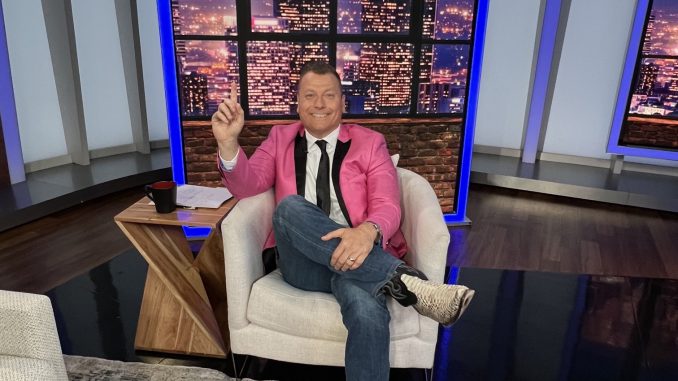
He does it all, folks. While continuing as the host of a nationally syndicated radio program, FOX Across America (weekdays from noon to 3 p.m.), Jimmy Failla has been named the new host of FOX News Saturday Night (Saturdays, 10 p.m.), in addition to releasing the book, Cancel Culture Dictionary, which earned a spot on The New York Times bestsellers’ list and having a one-hour stand-up comedy performance recorded, Jimmy Failla: They’re Just Jokes. All of this, credited to the funny guy from Levittown.
Since joining the FOX network as a writer in 2016, Failla has brought his signature comedic take across FOX News Media’s platforms during daytime and primetime programming His nationally syndicated talk radio show, FOX Across America with Jimmy Failla, launched in March of 2020 on 27 radio stations and can now be heard on more than 150 stations across the country. Prior to his role on television and as a standup comedian, Failla was a New York City cab driver.
I spoke with Failla about his career achievements. Here’s what he had to share.
CH: First things first. Let’s talk about the show.
JF: On a Saturday night, I’d like to believe the world is tired of fighting over politics. So, we’re trying to give the world a safe space for people who just want to laugh, coexist, and not beat each other up over disagreements. Essentially, the show is a keg party. As a comedian, you want your jokes to work everywhere. You don’t want to be like, “Well, I’m only funny on this side of the room.” The show doesn’t really adhere to a political ideology. I want this to be the one show that everyone can watch and feel welcome at. I can’t say that’s the case for most of the late night [shows] right now.
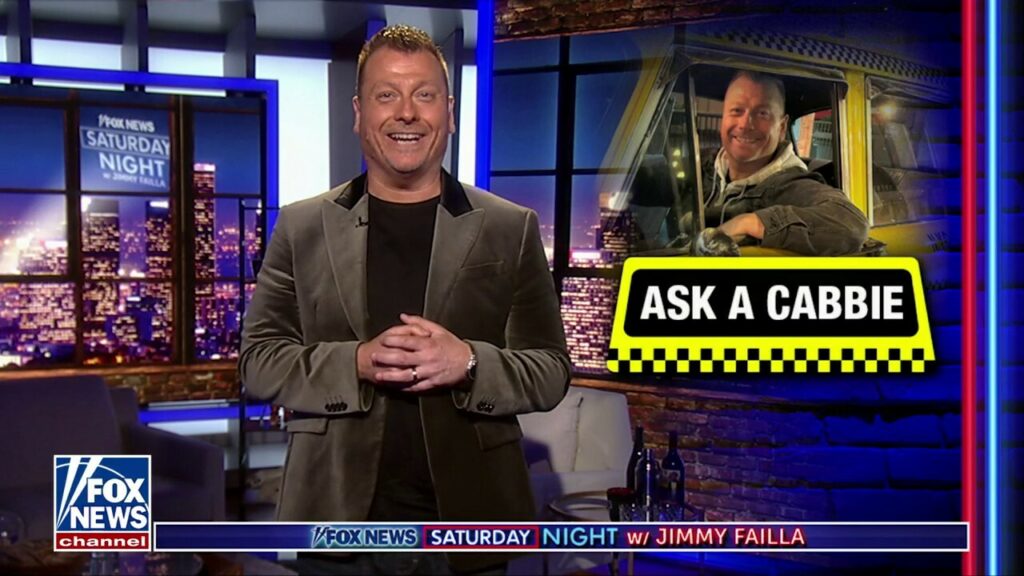
CH: Who is your audience? Who are you playing to?
JF: In all honesty, [I appeal to] people who recognize how lucky we are to live in this country as people with perspective. I started [my career] as a cab driver. I realize how fortunate I am to be in the position that I am in. I also realize how fortunate we all are given that we live in the most prosperous place on the planet. My audience is people who recognize that the whole point of being alive is to have fun. And I know those people exist in both [political] parties. You won’t find a lot of my jokes aimed at anyone, so much as they’re just like, hey, what’s funny about this [thing]. Fun-loving people are my audience.
CH: Were you always involved in politics?
JF: I was while I was driving a cab every day. A taxi is the original form of social media. The first guy gets in and just gives you an opinion on the news that you share with the second guy that he shares with somebody he runs into; you continue to evolve the discussion over the course of 40 or 50 passengers a day. It was driving a taxi that got me into the issues, because the issues would just come through the partition. You didn’t have to particularly care; people would just tell you things whether you wanted to hear it or not. By the time I booked FOX, I was so used to talking politics with strangers, that to do it on a set was easy.
CH: Did you always know that you were funny?
JF: I guess I did, because everyone around me was funny; my family told a lot of jokes. I had an Uncle Sonny who was a socially dominant figure. He knew street jokes, “two guys walk into a bar…” and it was silly. My dad, my brothers, my uncles, my cousins, everyone was a cop in the family except me. It was a lot of tough love because cops like to pick on each other. Their affection is shown through a put-down. I didn’t know any difference; I thought everyone was fun and funny and always had a good time. It was one of my teachers [Mrs. Pascana] who told me to go home, ask your parents to stay up late and watch The Tonight Show. She said, “You’re kind of a talk show host; you don’t realize that; you should watch it and see.” I loved The Tonight Show. She encouraged me and said I could do that one day. I was in fifth grade. As a kid, you believe authority figures like that. I took it with me the rest of the way; it took me 40 years, but here we are.
CH: How did you get started in stand-up?
JF: I just started looking around for open mics, amateur nights, and stuff like that. I knew Caroline’s on Broadway in Times Square had a new talent show. You have to bring 10 people as your audience in order to get on stage. Nobody knows who you are; nobody cares. The place wasn’t even open; it was noon on a Sunday; I just remember it was June 24, maybe 2001. I am not even sure Caroline knew we were there, not kidding. I went on stage and told a bunch of “C-plus” jokes at best. It’s so surreal to be there. To get any reaction from the audience feels a lot bigger than it was. You step out of there expecting the limo to be waiting to pick you up; that’s what propels you in the beginning. You feel like you changed the world and then you go back and listen to the recording and the two laughs you thought you got were of somebody coughing and another guy’s phone going off.
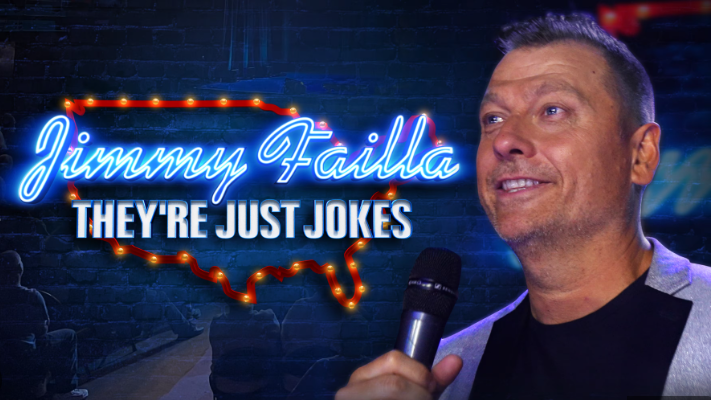
CH: How did you make the connection to FOX?
JF: They found me. I was performing at the Gotham Comedy Club (in Chelsea 23rd and 7th). One of the FOX bookers asked me to be on the show the very next day. This was in 2015. It eventually picked up steam and now we are sitting here and it’s just bananas.
CH: What has your family’s response been to your career?
JF: My family was there from the beginning; they fought the ground war in terms of watching me evolve as an artist, as an actual talent. I do, honestly, think they feel like part ownership in my success because they were such a big part of the incremental growth. I always talk about my family; I’ve had my wife and my kid on my TV show. My mom is making a cameo [on an upcoming show]. The people around me should benefit too. I’m one of the stupid people who has something amazing happen to them.
CH: Who has influenced your comedy?
JF: As a kid, it was Rodney Dangerfield just because he was funny. You could hear one of his jokes and tell it to your friends. Eddie Murphy too because he was dirty. And when you’re like eight years old, the idea of anyone cursing a lot blows your mind. As I developed, I would say Bill Maher. I listened to a lot of Don Imus when I drove a cab. I loved what he was doing, covering the news comedically.
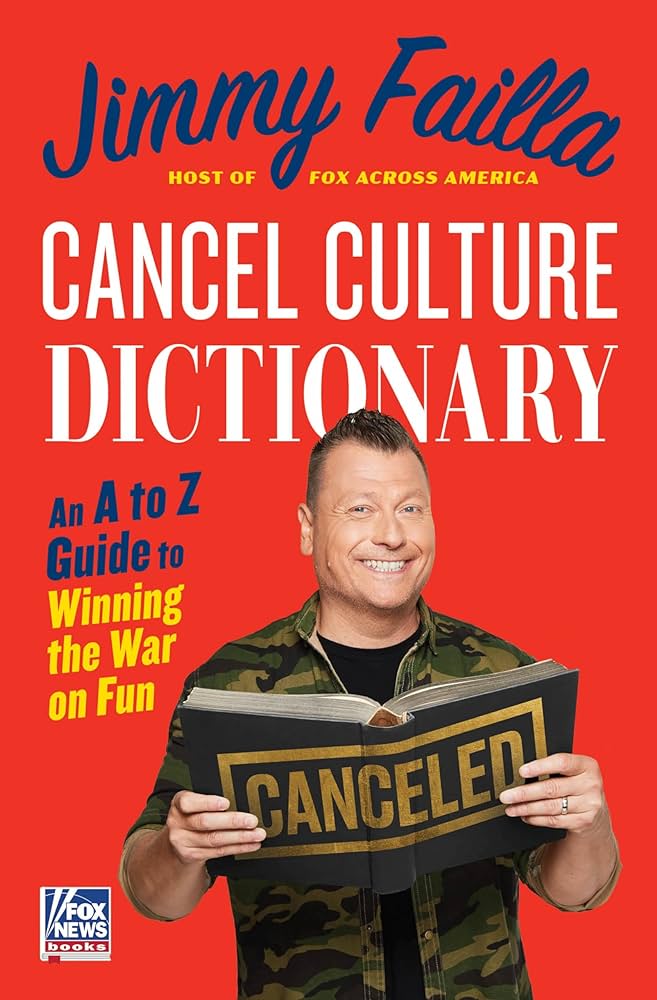
CH: Tell me about the new book, Cancel Culture Dictionary.
JF: I might be the first community college graduate to get on the list, so I want credit for that. I went to Nassau Community College “Turnpike Tech”. The thing about community college is that it’s no nonsense. If you’re there to do something great, you can really help yourself. When I was there, I was exactly the opposite. I was one of the dudes that was enrolled just to stay on his parents’ health insurance. The whole hook of the book, Cancel Culture Dictionary, is that I believe in the age of social media and incentivized outrage. What I mean by incentivized outrage is that nowadays people expect to get things by saying they’re offended. Things like, “I don’t like Dave Chappelle jokes, so now I’d like a promotion at Netflix,” kind of stuff. I feel like social media has broken our compass; we’re going after a lot of superficial things that don’t matter. People who are canceling things like syrup bottles and sports mascots aren’t improving anybody’s life, but we’re rewarding them with a fake award. It’s not real activism. It’s like slacktivism. The book is not for “how do we beat these people,” I say it’s a guide to winning the war on fun, like a call to chill out. This is a once-in-a-lifetime moment for me, and in terms of thinking about how I can help the world, I think everybody can help the world by just chilling out. We’re not going to out-argue each other at this point. The two sides are far too entrenched politically. So, if somebody could just be cool for like a half hour, I think it would really help us. I think it would help the world because we get back perspective. That’s essentially what the book is. Most of the things that get canceled ultimately come back, like 99 percent of them. In the end, it was all a worthless endeavor, but we just divided the heck out of society by making everything a battleground. Sports used to be like a place where we had a common culture. But eventually, we began fighting over the politics of sports, music, movies, comedy, and they became battlegrounds. I hate that. I think everything doesn’t need to have a side. The biggest problem in society right now is everybody feels like they have to take a side the minute you hear the news. Why can’t we hear something, have an opinion, and move on?
CH: Tell me about growing up in Levittown.
JF: I graduated from Division Avenue High School. I was known for heckling in baseball games. This is a very important part of my story. The late and great Doug Robbins, baseball coach at Division, won a bunch of state titles as coach. He had two sons, Dougie and Steve. I graduated in 1995 with Steve, who is a coach at Division now. From my freshman year through my senior year, I would sit in the bleachers at every home game and heckle the other teams to the point that it was comedic; it was disruptive. It was so effective that [Coach Robbins] used to take me out of eighth period class and give me the dirt on who we were playing. Dennis Schneider won the Diamond Award that year for being the best player on Long Island as a pitcher. He went on to C.W. Post. Dennis threw a no-hitter on Memorial Day, but I got the game ball from the coach because of how rattled the other team. It was so silly. That’s kind of how I got my start as a performer, by sitting in the bleachers and ragging on the other team. When this goes to print there are going to be hundreds of people who say, “I remember that guy!”
CH: Who are some of the most memorable people from growing up in Levittown?
JF: That was Mrs. Pascana at Abbey Lane Elementary School. Sadly, she is sadly no longer with us. I wanted to find her when the show launched. I have connected with one of my fourth-grade teachers and had her as a guest at my standup special. At Division Avenue High School, my biggest influences were the coaches like Coach Robbins (late) and the principal John Allen, who was the Division Avenue principal through the late ’80s, he’s got to be retired now. He was a no-nonsense guy, but he had a sense of humor. He had real authority, almost a military vibe, but I could get a thunderous laugh out of him. Although, I am sure he wanted to kick my ass most of the time.
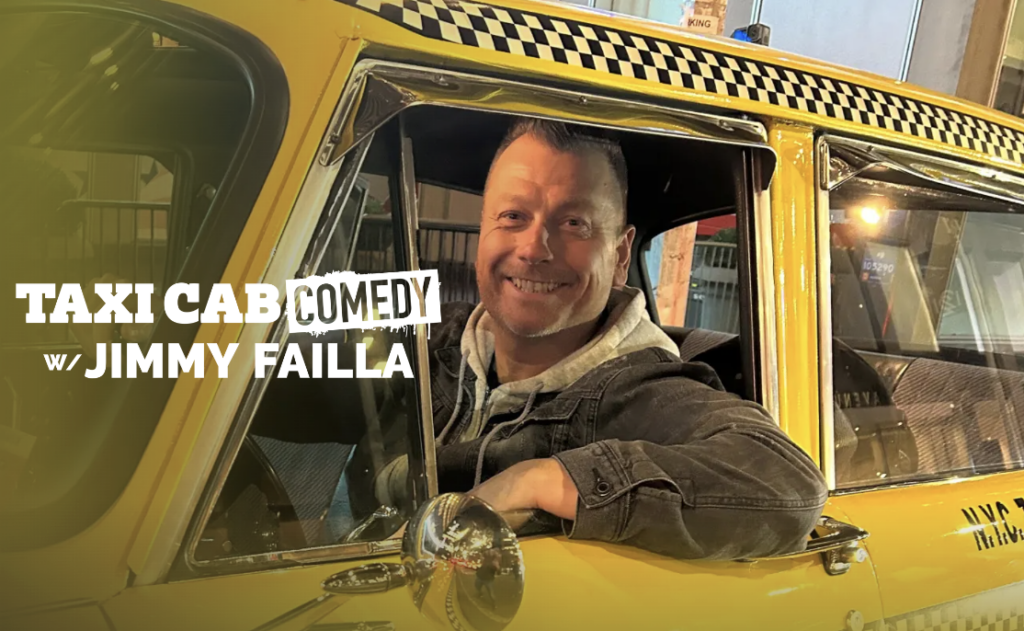
CH: Any advice for someone who’s trying to break in, starting out in the biz?
JF: I would say that, first and foremost, our medium is so fragmented, there’s so many people who are on the wrong end of supply and demand. People get into showbiz with the idea that they’re automatically going to make it. You’ve got to be authentic; you’ve got to be uniquely yourself. The truth is you can’t stand out by trying to fit in. And I think what a lot of people do wrong, that they are trying to break into showbiz, is they see what’s working for other people and try to emulate it. The reason it’s working for other people is because it’s uniquely who they are. Understand that you’re competing against yourself. You’re not competing against the other comic who got a sitcom, because you aren’t even up for that sitcom, you’re competing against your ability to sell it. Make sure you keep working and writing new material and to force yourself to get better, that creates a market for what you do. The problem is a lot of people go into comedy, and I was certainly one of them at one point, where do you get okay at it and then you just sit around and whine about all the people getting the things you want. You don’t realize that it was just their moment or that they worked harder. Work hard but be yourself. Everyone who truly pops is a character; they’re a character that they’ve developed over the course of time by only focusing on what’s unique about them. [Andrew Dice Clay is] such a great example of that. You can’t stand out by fitting in; there is nothing about the Diceman that will ever fit in. I mean, he is just such an iconic character, the cigarette, the hair. He is phenomenal. That’s what pops. When people leave a comedy club, they describe you based on something you talked about. When I was on my way up, I talked a lot about driving a cab. People leaving the club would always be like, “Yeah, you know, the guy talked about the cab was good (or ‘he sucked’)” What you talk about brands you in their mind. If you were a flight attendant, the audience would be like, “Oh, that girl, the one that talked about being a flight attendant, she was fun.” That’s how it works.
Check out Failla on the new show FOX News Saturday Night with Jimmy Failla airing weekly from 10 to 11 p.m. on FOX.
Post Views: 36

